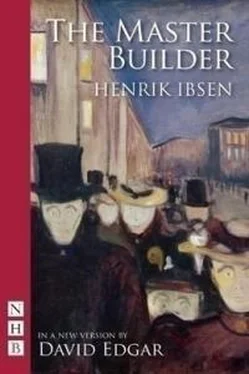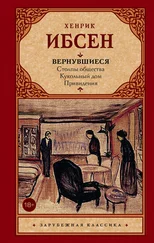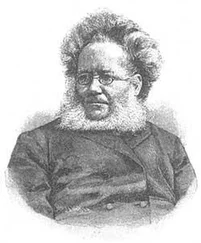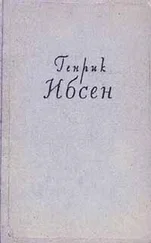SOLNESS.
[Evasively.] Stay here with me, Ragnar. You shall have everything your own way. And then you can marry Kaia, and live at your ease—and happily too, who knows? Only don't think of building on your own account.
RAGNAR.
Well, well, then I must go home and tell father what you say—I promised I would.—Is this what I am to tell father—before he dies?
SOLNESS.
[With a groan.] Oh tell him—tell him what you will, for me. Best to say nothing at all to him! [With a sudden outburst.] I cannot do anything else, Ragnar!
RAGNAR.
May I have the drawings to take with me?
SOLNESS.
Yes, take them—take them by all means! They are lying there on the table.
RAGNAR.
[Goes to the table.] Thanks.
HILDA.
[Puts her hand on the portfolio.] No, no; leave them here.
SOLNESS.
Why?
HILDA.
Because I want to look at them, too.
SOLNESS.
But you have been― [To RAGNAR.] Well, leave them here, then.
RAGNAR.
Very well.
SOLNESS.
And go home at once to your father.
RAGNAR.
Yes, I suppose I must.
SOLNESS.
[As if in desperation.] Ragnar—you must not ask me to do what is beyond my power! Do you hear, Ragnar? You must not!
RAGNAR.
No, no. I beg you pardon—
[He bows, and goes out by the corner door. HILDA goes over and sits down on a chair near the mirror.
HILDA.
[Looks angrily at SOLNESS.] That was a very ugly thing to do.
SOLNESS.
Do you think so, too?
HILDA.
Yes, it was horribly ugly—and hard and bad and cruel as well.
SOLNESS.
Oh, you don't understand my position.
HILDA.
No matter—. I say you ought not to be like that.
SOLNESS.
You said yourself, only just now, that no one but I ought to be allowed to build.
HILDA.
I may say such things—but you must not.
SOLNESS.
I most of all, surely, who have paid so dear for my position.
HILDA.
Oh yes—with what you call domestic comfort—and that sort of thing.
SOLNESS.
And with my peace of soul into the bargain.
HILDA.
[Rising.] Peace of soul! [With feeling.] Yes, yes, you are right in that! Poor Mr. Solness—you fancy that—
SOLNESS.
[With a quiet, chuckling laugh.] Just sit down again, Hilda, and I'll tell you something funny.
HILDA.
[Sits down; with intent interest.] Well?
SOLNESS.
It sounds such a ludicrous little thing; for, you see, the whole story turns upon nothing but a crack in the chimney.
HILDA.
No more than that?
SOLNESS.
No, not to begin with.
[He moves a chair nearer to HILDA and sits down.
HILDA.
[Impatiently, taps on her knee.] Well, now for the crack in the chimney!
SOLNESS.
I had noticed the split in the flue long, long before the fire. Every time I went up into the attic, I looked to see if it was still there.
HILDA.
And it was?
SOLNESS.
Yes; for no one else knew about it.
HILDA.
And you said nothing?
SOLNESS.
Nothing.
HILDA.
And did not think of repairing the flue either?
SOLNESS.
Oh yes, I thought about it—but never got any further. Every time I intended to set to work, it seemed just as if a hand held me back. Not to–day, I thought—to–morrow; and nothing ever came of it.
HILDA.
But why did you keep putting it off like that?
SOLNESS.
Because I was revolving something in my mind. [Slowly, and in a low voice.] Through that little black crack in the chimney, I might, perhaps, force my way upwards—as a builder.
HILDA.
[Looking straight in front of her.] That must have been thrilling.
SOLNESS.
Almost irresistible—quite irresistible. For at that time it appeared to me a perfectly simple and straightforward matter. I would have had it happen in the winter–time—a little before midday. I was to be out driving Aline in the sleigh. The servants at home would have made huge fires in the stoves.
HILDA.
For, of course, it was to be bitterly cold that day?
SOLNESS.
Rather biting, yes—and they would want Aline to find it thoroughly snug and warm when she came home.
HILDA.
I suppose she is very chilly by nature?
SOLNESS.
She is. And as we drove home, we were to see the smoke.
HILDA.
Only the smoke?
SOLNESS.
The smoke first. But when we came up to the garden gate, the whole of the old timber–box was to be a rolling mass of flames.—That is how I wanted it to be, you see.
HILDA.
Oh, why, why could it not have happened so!
SOLNESS.
You may well say that, Hilda.
HILDA.
Well, but now listen, Mr. Solness. Are you perfectly certain that the fire was caused by that little crack in the chimney!
SOLNESS.
No, on the contrary—I am perfectly certain that the crack in the chimney had nothing whatever to do with the fire.
HILDA.
What!
SOLNESS.
It has been clearly ascertained that the fire broke out in a clothes–cupboard—in a totally different part of the house.
HILDA.
Then what is all this nonsense you are talking about the crack in the chimney!
SOLNESS.
May I go on talking to you a little, Hilda?
HILDA.
Yes, if you'll only talk sensibly—
SOLNESS.
I will try to. [He moves his chair nearer.
HILDA.
Out with it, then, Mr. Solness.
SOLNESS.
[Confidentially.] Don't you agree with me, Hilda, that there exist special, chosen people who have been endowed with the power and faculty if desiring a thing, craving for a thing, willing a thing—so persistently and so—so inexorably—that at last it has to happen? Don't you believe that?
HILDA.
[With an indefinable expression in her eyes.] If that is so, we shall see, one of these days, whether I am one of the chosen.
SOLNESS.
It is not one's self alone that can do such great things. Oh, no—the helpers and the servers—they must do their part too, if it is to be of any good. But they never come of themselves. One has to call upon them very persistently—inwardly, you understand.
HILDA.
What are these helpers and servers?
SOLNESS.
Oh, we can talk about that some other time. For the present, let us keep to this business of the fire.
HILDA.
Don't you think that fire would have happened all the same—even without your wishing for it?
SOLNESS.
If the house had been old Knut Brovik's, it would never have burnt down so conveniently for him. I am sure of that; for he does not know how to call for the helpers—no, nor for the servers, either. [Rises in unrest.] So you see, Hilda—it is my fault, after all, that the lives of the two little boys had to be sacrificed. And do you think it is not my fault, too, that Aline has never been the woman she should and might have been—and that she most longed to be?
HILDA.
Yes, but if it is all the work of these helpers and servers—?
SOLNESS.
Who called for the helpers and servers? It was I! And they came and obeyed my will. [In increasing excitement.] That is what people call having the luck on your side; but I must tell you what this sort of luck feels like! It feels like a great raw place here on my breast. And the helpers and servers keep on flaying pieces of skin off other people in order to close my sore!—But still the sore is not healed—never, never! Oh, if you knew how it can sometimes gnaw and burn!
HILDA.
[Looks attentively at him.] You are ill, Mr. Solness. Very ill, I almost think.
SOLNESS.
Say mad; for that is what you mean.
HILDA.
No, I don't think there is much amiss with your intellect.
SOLNESS.
With what then? Out with it!
Читать дальше









